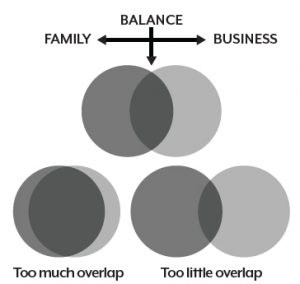 By Tom Hubler, Executive Consultant
By Tom Hubler, Executive Consultant
The entrepreneurial spirit flourishes in today’s society. People want their own business – for the freedom, for higher earning potential; or because they have a great idea, because they are the next generation. And people who have their own business naturally bring along their families. Even family members who do not work in the business are still part of it by blood and marriage.
When I began working with business families years ago, I noted that everyone was greatly concerned about the bottom line on the financial statement. But I soon realized there was no parallel concern about a bottom line on the family side, about issues between family members. Families were eager to improve their financial equity but were reluctant to confront personal issues that build or erode emotional equity. It became clear to me that the bottom line for families in business is three-fold: appreciation, recognition, and love. These represent the profit margins that produce emotional equity. But, as they say, openly sharing these issues is delicate.
People find it uncomfortable or even embarrassing to show appreciation, recognition, and love. These feelings are seldom expressed. My experience is that once into their sixties, seventies and older, people secretly want to be validated for what they have done over the years. They may deny it, but they want to know they are loved and appreciated for what they have done.
Of course, parents love their children, and children love their parents. But it is usually just assumed, and seldom expressed. Adult children sometimes seem to take the older generation for granted. When I raise the subject, both parents and their adult children say the same thing, “Oh, they know I love them, I don’t have to talk about it all the time.” Family business members certainly love each other, but it doesn’t go without saying. My response is always the same: “Then tell each other.”
 Business families typically spend most of their time and money on the business. Makes sense. Yet this focus can exact a price in personal relationships among spouses and adult children, and grandchildren, and in-laws. Business and family are intertwined. Individuals need to consciously and intentionally recognize and value each other. If not, feelings get hurt. People stop talking. Relationships suffer. And inevitably, family frictions in turn put stress on the business.
Business families typically spend most of their time and money on the business. Makes sense. Yet this focus can exact a price in personal relationships among spouses and adult children, and grandchildren, and in-laws. Business and family are intertwined. Individuals need to consciously and intentionally recognize and value each other. If not, feelings get hurt. People stop talking. Relationships suffer. And inevitably, family frictions in turn put stress on the business.
Stakeholders need to find, define, and develop a balance between the two powerful environments of business and family. This is critical so that neither of the two do overly influences each other.
When the overlap is too great, the business is vulnerable to family entanglements; when too small, it is robbed of the qualities of the family culture. This is not speculation. Family businesses measurably outperform non-family businesses including Standard and Poor’s (S&P) and Fortune 500 companies. These qualities are ‘messy’ because they portray family values, loyalty, and trust. However, when these qualities are neglected, the business suffers along with the family. So, when family and business are kept in balance, the bottom line both for the business and the family is quantitatively better.
For more information about family businesses, visit our Family Business Service page.
